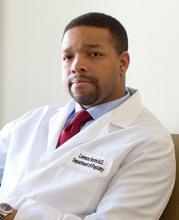Andrew Penn, MS, NP, conducts a Masterclass lecture on psychedelic-assisted psychotherapy from the Psychopharmacology Update in Cincinnati. The meeting was sponsored by Global Academy for Medical Education and Current Psychiatry.
Mr. Penn, a psychiatric nurse practitioner, is associate clinical professor of community health systems in the School of Nursing at the University of California, San Francisco.
Later, Dr. Renee Kohanski is back – this time to discuss the need to call out the truth when we see it.
* * *
Help us make this podcast better! Please take this short listener survey: https://www.surveymonkey.com/r/podcastsurveyOct2019
* * *
Reemergence of MDMA for PTSD and psilocybin for MDD
- Psychedelic-assisted psychotherapy is currently being investigated with 3,4-methylenedioxy-methamphetamine (MDMA) for treatment-resistant post-traumatic stress disorder (PTSD) and psilocybin for the treatment of major depressive disorder (MDD). The use of these compounds would be highly regulated. These are not medications that would be dispensed for a patient to take home.
- Both would be given in the clinical setting of one or more psychotherapy sessions with two therapists who would continue to work with the patient over time.
- MDMA was first patented by Merck in 1912, synthesized again in the 1970s, and used by psychotherapists to assist treatment. However, its recreational use spread, leading to its classification as a Schedule I controlled substance, thus prohibiting research or use in a medical setting.
- Lobbying through the Multidisciplinary Association for Psychedelic Studies, also known as MAPS, managed to bring MDMA into phase 3 clinical trials, and in 2017 the Food and Drug Administration granted breakthrough therapy designation for its use with psychotherapy for PTSD.
- MDMA is a potent releaser of serotonin, oxytocin, and prolactin, which in combination, allow the patient to feel less fear, trust the psychotherapist more, and overcome the defenses blocking them from talking about traumatic experiences. MDMA permits patients to stay in the optimal arousal zone to discuss the traumatic event. After the psychedelic-assisted session, patients continue to process memories and sequelae of the event and integrate changes into their lives to overcome trauma.
- If MDMA is approved by the FDA, it would be available only under a REMS, or Risk Evaluation and Mitigation Strategy, or drug safety program.
- Psilocybin is a partial agonist on 5-HT2A serotonin receptors. The brain of a severely depressed person is extremely rigid with limitations on the usual predictive capacity of the human brain. Psilocybin facilitates plasticity to “reset” and see a situation as it truly is, rather than through the rigid cognitive distortions of depression.
- Although MDMA and psilocybin are controlled substances, we can think of these medications like anesthetics, which are drugs that can be prescribed in clinical settings under supervision only.
- These are old compounds used in a novel manner that can reduce suffering for patients who have not responded to the current modes of therapy for PTSD and MDD.
References
Mithoefer MC et al. MDMA-assisted psychotherapy for treatment of PTSD: Study design and rationale for phase 3 trials based on pooled analysis of six phase 3 randomized trials. Psychopharm (Berl). 2019 Sep;236(9):2735-45.
Carhart-Harris RL et al. Psilocybin with psychological support for treatment-resistant depression: An open-label feasibility study. Lancet. 2016 Jul 1:3(7):619-21.
Pollan M. The Trip Treatment. New Yorker. 2015 Feb 9.
Cooper A. Psilocybin sessions: Psychedelics could help people with addiction and anxiety. 60 Minutes. 2019 Oct 13.
Sessa B. “The Psychedelic Renaissance: Reassessing the Role of Psychedelic Drugs in 21st Century Psychiatry and Society.” London: Muswell Hill Press, 2012.
Usona Institute: News on Psychedelics
For more MDedge Podcasts, go to mdedge.com/podcasts
Email the show: podcasts@mdedge.com
Interact with us on Twitter: @MDedgePsych


